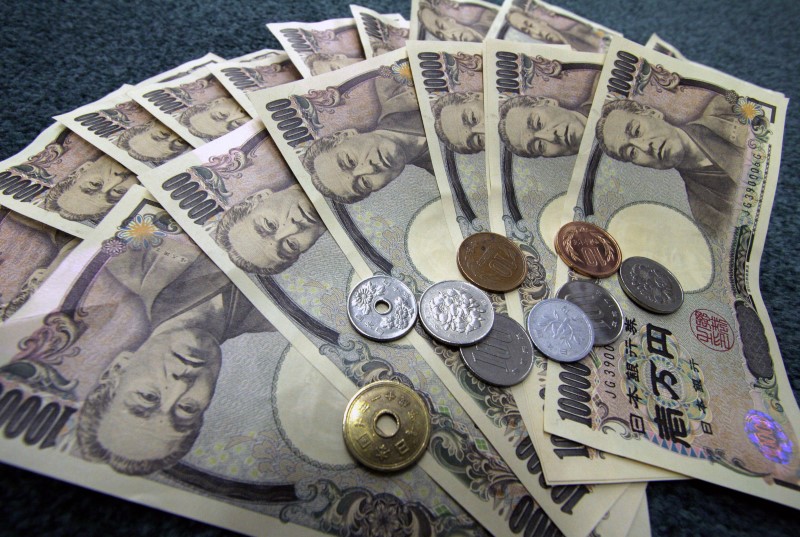Two 59%+ winners, four above 25% in Aug – How this AI model keeps picking winners
* U.S. retail sales plunge, IMF forecasts Asian growth
halting
* Nikkei down 1.3%, ASX 200 falls 1.5%
* Dollar and bonds hold gains
* Asian stock markets: https://tmsnrt.rs/2zpUAr4
By Tom Westbrook and Koh Gui Qing
SINGAPORE/NEW YORK, April 16 (Reuters) - World stock markets
fell on Thursday, while bonds and the dollar held on to hefty
gains, after a coronavirus-driven plunge in U.S. retail sales
and factory production and increasing gloomy economic outlooks
for Asia.
U.S. retail sales fell the most on record last month, while
manufacturing output fell by the most in 74 years, raising fears
of a deep recession. In Asia, growth will grind to zero for the first time in 60
years in 2020, the International Monetary Fund said on Thursday,
as exporters are pounded by slumping demand and anti-virus
measures force consumers to stay home and shops to shut down.
MSCI's broadest index of Asia-Pacific shares outside Japan
.MIAPJ0000PUS fell 0.6%. In Japan, where a Reuters survey
showed most firms feel stimulus measures announced so far are
insufficient, the Nikkei .N225 fell 1.3%. E-mini futures for the S&P 500 ESc1 were 0.3% lower
following a 2.2% drop on Wall Street overnight. .N
"It's just a reminder of how deep the economic weakness has
been," said Paul Chew, head of research at Singapore brokerage
Phillip Securities.
The relatively modest drop shows some level of optimism
about a brisk re-start, he said, but added: "The problem is,
no-one knows how long this will go for."
Benchmark indexes in Australia .AXJO , Korea .KS11 , Hong
Kong .HSI and Shanghai .SSEC also posted falls between 0.3%
and 1.5%. China is expected to report on Friday that the health
crisis likely knocked its economy into its first decline on
record. The dollar rose against most major currencies and the yield
on benchmark 10-year U.S. Treasuries US10YT=RR held at
0.6348%, near the week-low hit on Wednesday. FRX/ US/
Oil prices, a barometer of global growth, crept from
overnight lows but remained weak as poor demand outweighs
support from a record output cut agreed last weekend. O/R
West Texas Intermediate crude CLc1 rose 60 cents a barrel
or 3% from its lowest close since 2002 to $20.46, and Brent
crude LCOc1 rose 80 cents to $28.50 a barrel.
CURRENCIES CAUTIOUS
The grim outlook was further underscored by warnings from
major U.S. banks Goldman Sachs Group Inc GS.N and Citigroup
Inc C.N of future loan losses as they posted drops in profits.
Markets are bracing for more bad news when U.S. weekly
jobless claims - which have been in the millions for the past
three weeks - are published at 1230 GMT.
A figure of 5.1 million is expected, according to a Reuters
poll, and trepidation was reflected in currency markets. The
safety of the U.S. dollar was sought with the yen, euro, pound
and Antipodean currencies slipping.
The dollar last bought 107.78 yen JPY= and hit a week-high
$0.6282 per Australian dollar AUD=D3 .
It advanced furthest against the kiwi, rising about 0.7% to
$0.5955 after New Zealand's central bank governor said negative
rates are a possibility. Adding to traders' worries, the dire economic news also came
with sharp rises in COVID-19 fatalities.
The United States is the world's worst-affected country and
its coronavirus death toll topped 30,000 on Wednesday. The
fatalities have doubled in a week and set a record single-day
increase for the second day in a row. New cases are slowing and President Donald Trump said he
would announce guidelines for reopening the economy on Thursday.
However, state governors - especially on the East Coast -
seem to be pushing for a cautious approach.
"Markets are looking for the peak in the viral spread, but
this is only the start of a very bumpy road back to economic
strength," said Kerry Craig, global market atrategist at J.P.
Morgan Asset Management.
"Investors should remain vigilant to what the market is
pricing and realise that market rallies in a longer bear market
are not unusual."
